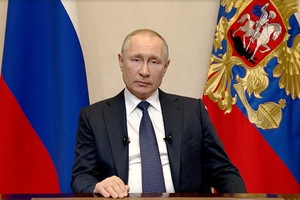EU agrees partial ban on Russian oil imports
The European Union has reached an agreement on a partial ban on Russian oil imports as part of the sixth round of sanctions, European Council President Charles Michel said on Twitter.
“An agreement to ban the EXPORT of Russian oil to the EU. This immediately covers more than two-thirds of oil imports from Russia, cutting a huge source of funding,” Michel wrote.
video
Later, during a press conference, the head of the EU clarified that the ban would not apply to oil supplies through pipelines.
The head of the European Commission (EC), Ursula von der Leyen, tweeted that she welcomes the decision on the oil embargo, which will reduce EU oil imports from Russia by the end of the year by about 90%.
Leonid Fedun New paradigm of the Russian oil industry Opinion
The head of the EC also said that the members of the European Union "agreed to put an end to dependence on Russian gas, oil and coal as soon as possible." Von der Leyen indicated that REpowerEU's plan to achieve this goal would include four points:
Which ruble is beneficial for the state - strong or weak? Articles Pro How to restore peace and faith in the future for yourself and your employees - 5 steps Instructions usaand CHINA are fighting for the market of rare earth metals. How to make money on it Articles Pro TELEGRAM is getting closer to the dream of a superapp. energy saving; moving away from Russian fossil fuels; large investments in renewable energy sources; €300 billion in funding, most of which will go to the Recovery and Rescue Fund (RRF).During a press conference, the head of the EC explained that the European Union received one third of its raw materials through oil pipelines, while Poland and Germany decided to refuse any form of Russian oil supplies, so that by the end of the year it will only come to the EU through the Druzhba pipeline, on which accounts for 10% of the total volume of oil bought by the European Union from Russia.
Russia's permanent representative to international organizations in Vienna, Mikhail Ulyanov, commenting on the embargo approval on Twitter, indicated that Moscow would be able to find new oil buyers.
The European Union agreed to disconnect Sberbank from SWIFT Politics
The European Union began drafting a sixth package of sanctions in April, and since early May has been working to agree on an oil embargo included there. The first proposals concerned a complete ban on oil imports from Russia, but Hungary, which is highly dependent on Russian hydrocarbon supplies, opposed it.
As REUTERS reported, instead of a complete embargo, EU countries began to discuss a ban on oil supplies to the European Union by sea. This implied that oil would continue to flow to the EU through the Druzhba pipeline, through two branches of which raw materials go to eight European countries.
Hungarian Prime Minister Viktor Orban on May 30 called the decision "good", but said that Budapest would like to receive guarantees that if oil stops flowing through Druzhba, Hungary will be able to buy Russian raw materials supplied by sea. Earlier, the Ministry of Energy of Ukraine, through whose territory the oil pipeline branch passes to Hungary, called the latter an “excellent lever” of pressure on Budapest and stated that “it would be very appropriate if something happened to it.”
Export of Russian oil by sea increased amid the discussion of EU sanctions Business
On May 17, Russian President Vladimir Putin said that as a result of "chaotic actions" by the EU countries, their economies are being damaged, while the revenue of the Russian oil and gas sector is growing. He called what is happening "an economic auto-da-fé, a suicide" of European states.
At the same time, the head of state stressed that “in the new conditions” Russia should not only produce oil, but also stimulate projects for its deep processing, as well as develop “domestic technologies for oilfield services, including the development and operation of fields.”
Back in early May, Deputy Prime Minister Alexander Novak said that Russian oil had new buyers, in addition, there was an increase in exports to suppliers in the Asia-Pacific direction. On May 27, BLOOMBERG, citing estimates by Kpler analysts, reported that Asian countries for the first time overtook Europe in terms of the volume of oil purchased from Russia: over the previous week, tankers transported from 74 million to 79 million barrels, which was almost three times higher than in the period up to February 24.
Dietary supplements and vitamins in EAPTEKE. Fast shipping. Medicines at competitive prices. Discounts and promotions. Vitamins for all occasions. Order on the site!
